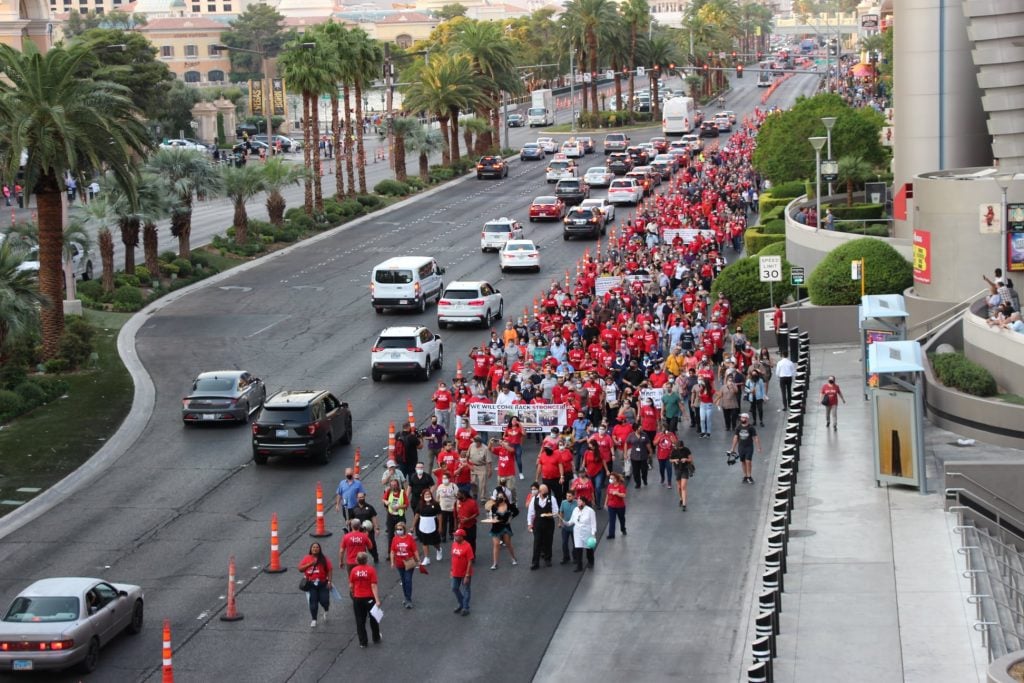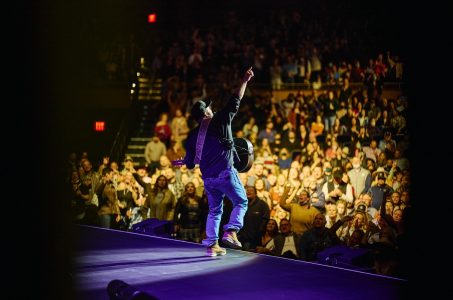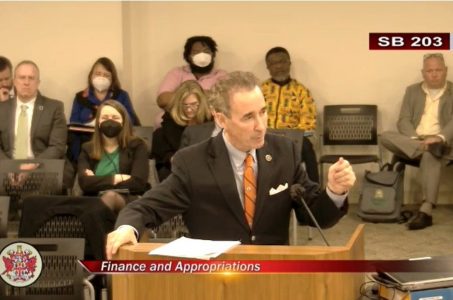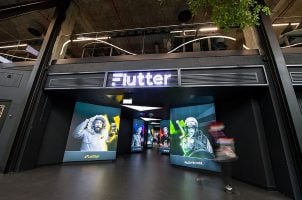Culinary Union Hits the Strip, Hopes More Visitors Will Mean More Workers Recalled
Posted on: September 26, 2021, 09:47h.
Last updated on: September 27, 2021, 09:33h.
Hundreds of casino resort workers and their supporters marched down the Las Vegas Strip Friday evening to say they’re ready to get back to work.

The Culinary Union Local 226 held the event. Union officials noted that more than a third of its 60,000 members have yet to be called back to work. That’s since the COVID-19 pandemic forced all casinos across Vegas and Nevada to close temporarily.
After being shut down for nearly three months, Nevada’s casinos began to reopen with restrictions in June 2020. Those restrictions, which included capacity reductions, mask requirements, and other social distancing guidelines, were in place for nearly a year until being lifted for all operators on June 1.
Since then, Las Vegas has seen millions of visitors flock back to the Strip and the area’s other casinos, helping the state post record gaming revenue totals. Those numbers were posted despite the Vegas area becoming a hotspot for the COVID-19 delta variant. Even as cases rose dramatically, state and local officials chose not to reinstitute any capacity restrictions, although a mask mandate is back in effect in Las Vegas area public venues, such as casinos.
Despite that recovery, union officials noted that 21,000 of its members have yet to be called back to work. They’re hopeful that more of their members will get much-anticipated callbacks if the number of visitors continues its uptick.
Hospitality workers want loyal customers to return to Las Vegas and be provided with the quality service that they know Las Vegas offers,” the union said in a statement on its Facebook page. “Workers are ready to prepare and serve great food in full-service restaurants, make and serve quality drinks and beverages, and ensure guest rooms are cleaned and sanitized daily.”
Earlier this month, state and federal pandemic-related unemployment programs for workers ended in Nevada. That included the weekly $300 federal subsidy, as well as programs that extended benefits for workers who lost jobs because of the pandemic.
Largest Union in Nevada
The union is the largest in Nevada, and it represents more than a third of all Nevada’s union workers, according to US Bureau of Labor Statistics data. Culinary Union workers are employees at most of the casino properties on the Strip and in downtown Las Vegas. It’s also highly diverse, with women representing 55 percent of its ranks, while 45 percent of its members are immigrants.
Several marchers held signs urging more visitors to come back, as well as others stating: “We will come back stronger!” the theme of the march.
Marchers were clad in either their work uniforms or red t-shirts. Many of the red shirts bore the message “Vegas Strong,” with illustrations of waiters, chefs, hostesses and casino workers on them.
New State Law Covers Casino Workers
Culinary Union members who have not been recalled are subject to the “Right to Return” law Nevada state lawmakers passed earlier this year. The union was one of the strongest advocates for the bill.
It covers casino workers who lost their job as a result of the pandemic. If they were employed for at least six months prior to the pandemic, then the casino is required to give the laid off worker priority preference for a job. That’s provided the job is the same or similar to one the worker previously held at the casino.
Employers must give affected workers at least 24 hours to consider accepting a position. In addition, if a company chooses not to bring back a laid off worker for a position, the business must provide an explanation as to why they were not selected.
The law, which took effect on July 1, covers workers for up to two years, or when Nevada’s governor ends the COVID-19 state of emergency, whichever comes first.
Related News Articles
Garth Brooks Las Vegas Residency Battle Intensifies Following Park MGM Show
Petersburg, Va., Casino Dreams Canned, as Senate Committee Dismisses Gaming Bill
Gambling Industry Insiders Weigh In on UK’s Gambling White Paper
Most Popular
Mirage Las Vegas Demolition to Start Next Week, Atrium a Goner
Where All the Mirage Relics Will Go
Most Commented
-
Bally’s Facing Five Months of Daily Demolition for Chicago Casino
— June 18, 2024 — 12 Comments
















No comments yet